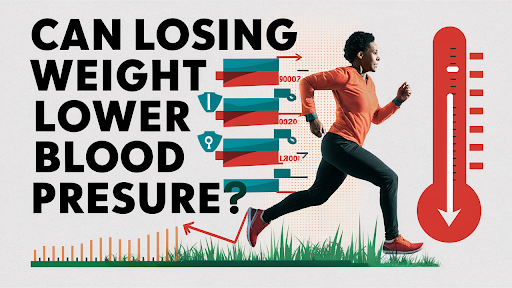
Losing weight has been discussed for years, and it’s no surprise that it has many benefits. One such benefit that is often overlooked is its impact on blood pressure.
High blood pressure, or hypertension, affects millions of people around the world and is a significant risk factor for heart disease and stroke. According to the World Health Organization, hypertension is responsible for an estimated 7.5 million deaths globally every year. With such alarming statistics, it’s clear that finding ways to manage and lower blood pressure is crucial for our overall health.
The Relationship Between Weight and Blood Pressure
We must first examine the relationship between weight and blood pressure to understand how losing weight can impact blood pressure. Excess weight, especially around the midsection, strains the heart and blood vessels, leading to increased blood pressure.
Additionally, carrying excess weight can lead to other health issues, such as insulin resistance and inflammation, which can contribute to high blood pressure. On the other hand, losing weight can help reduce strain on the heart and improve overall cardiovascular health, decreasing blood pressure.
The Research on Weight Loss and Blood Pressure
Numerous studies have investigated the effects of weight loss on blood pressure. A meta-analysis published in the Journal of Hypertension found that losing just 5% of body weight can significantly reduce systolic and diastolic blood pressure.
Furthermore, a study by the National Heart, Lung, and Blood Institute (NHLBI) showed that individuals who lost at least 10 pounds experienced a decrease in blood pressure readings by an average of 5.6 mm Hg for systolic and 4.5 mm Hg for diastolic.
How Does Weight Loss Lower Blood Pressure?
A few mechanisms at play contribute to decreased blood pressure when weight is lost. Firstly, as mentioned earlier, losing excess weight reduces strain on the heart and blood vessels, leading to lower blood pressure.
Weight loss also helps improve insulin sensitivity and reduce inflammation, which can contribute to high blood pressure. Furthermore, shedding extra pounds often decreases waist circumference, which is also linked to lower blood pressure.
Other Benefits of Weight Loss for Blood Pressure
Besides lowering blood pressure, losing weight has several other benefits that can contribute to overall heart health. These include:
- Lowering cholesterol levels: Excess weight and unhealthy eating habits can lead to high cholesterol levels, which is another risk factor for heart disease and stroke. Losing weight can help reduce cholesterol levels, thus improving heart health.
- Decreasing the risk of type 2 diabetes: Being overweight or obese is a significant risk factor for developing type 2 diabetes. Losing weight can lower one’s risk of developing this condition and decrease blood pressure.
- Improving overall cardiovascular health: Losing weight can also positively impact other aspects of heart health, such as improving blood flow and reducing the risk of blood clots.
- Improved liver function: Fatty liver disease is a condition in which excess fat accumulates in the liver, leading to inflammation and potential scarring. Losing weight can help reverse fatty liver disease and improve overall liver function.
How to Lose Weight for Better Blood Pressure
Now that we understand the relationship between weight loss and blood pressure, you might wonder how to lose weight to see these positive effects. Here are some tips:
- Follow a balanced and nutritious diet: A healthy and balanced diet is crucial for weight loss. Focus on incorporating plenty of fruits, vegetables, whole grains, and lean proteins into your meals.
- Engage in regular physical activity: Exercise helps with weight loss and directly reduces blood pressure. Aim for at least 30 minutes of moderate-intensity exercise, such as brisk walking, five times a week.
- Consult with a healthcare professional: If you have high blood pressure or are overweight, it’s essential to work with your doctor to develop a safe and effective weight loss plan.
Conclusion
In conclusion, losing weight can significantly reduce blood pressure. By shedding extra pounds, individuals can lower their heart disease and stroke risk, improve overall cardiovascular health, and experience various other benefits. If you have high blood pressure or want to maintain a healthy level, consider incorporating weight loss into your lifestyle for better health outcomes. Always consult a healthcare professional before significantly changing your diet or exercise routine.
